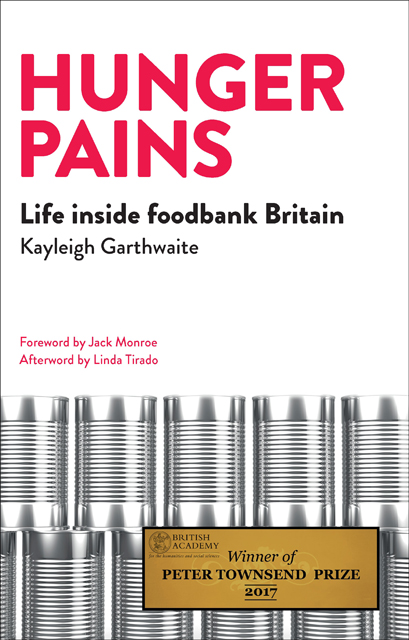Book contents
- Frontmatter
- Dedication
- Contents
- List of figures and boxes
- Acknowledgements
- Foreword by Jack Monroe
- Introduction
- one Researching foodbank use
- two Foodbanks: what do they do?
- three The politics of foodbank use in the UK
- four Why do people use a foodbank?
- five All work, low pay: finding, keeping and doing precarious jobs
- six “Doing the best I can with what I’ve got”: food and health on a low income
- seven Stigma, shame and “people like us”
- Conclusion: is foodbank Britain here to stay?
- Afterword by Linda Tirado
- Notes
- Bibliography
- Index
five - All work, low pay: finding, keeping and doing precarious jobs
Published online by Cambridge University Press: 15 April 2023
- Frontmatter
- Dedication
- Contents
- List of figures and boxes
- Acknowledgements
- Foreword by Jack Monroe
- Introduction
- one Researching foodbank use
- two Foodbanks: what do they do?
- three The politics of foodbank use in the UK
- four Why do people use a foodbank?
- five All work, low pay: finding, keeping and doing precarious jobs
- six “Doing the best I can with what I’ve got”: food and health on a low income
- seven Stigma, shame and “people like us”
- Conclusion: is foodbank Britain here to stay?
- Afterword by Linda Tirado
- Notes
- Bibliography
- Index
Summary
Working families are increasingly turning to foodbanks to make ends meet. The idea of ‘making work pay’ sounds like an empty refrain to the millions of people who are working, often in two or three jobs, and struggling to make a living. Work should offer a reliable route out of poverty. But low pay and the high costs of housing, childcare and transport prevent some people from working or earning more, trapping people in poverty. There are 6.7 million working people in the UK who are living in poverty, with more than half of people experiencing poverty now living in working households. More than half of households in working poverty (56%) contain a worker paid less than the Living Wage (set by the Living Wage Foundation); for the others, the issue is more the number of hours being worked than the amount they’re paid. These are jobs that are low paid, low skilled, inflexible, insecure and contribute to in-work poverty.
A large part of the reason why even working households are unable to make ends meet is because of the insecure, low-paid jobs that are far too common at the bottom end of the labour market. A record 5 million workers are now in low-paid jobs. The Resolution Foundation found that one in five employees in Great Britain – 21%, or 5.5 million individuals – were low paid. Their report said there was a serious problem of people being stuck in low-paid jobs, with almost one in four minimum-waged employees remaining on that rate for the last five years. And nearly 700,000 people are on zero-hours contracts in their main job – a rise of more than 100,000 on 2013 – according to official figures. In 2014 the ONS said that the number of people estimated to be employed on a zero-hours contract in their main job was 697,000, representing 2.3% of all people in employment. Some of Britain’s largest employers offer zero-hours contracts to employees. High street giants such as JD Wetherspoon, Burger King, Domino’s Pizza, Sports Direct and McDonald’s all use them. Around a third of people on them want more hours, the ONS added, saying that people on zero-hours deals are more likely to be women, students in full-time education or working part time. In the 2015 Summer Budget, George Osborne countered criticism of zero-hours contracts with the revelation of a National Living Wage (NLW) of £7.
- Type
- Chapter
- Information
- Hunger PainsLife inside Foodbank Britain, pp. 97 - 114Publisher: Bristol University PressPrint publication year: 2016

